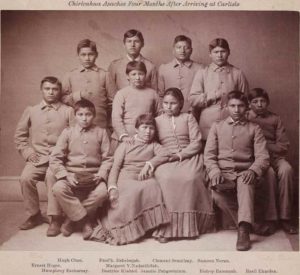 The 106-page Federal Indian Boarding School Initiative Investigative Report released on May 11 provides a glimpse into the deliberate intention of the federal government to disrupt the Native American family structure through assimilation. The report says the government’s plan involved the permanent breaking of family ties.
The 106-page Federal Indian Boarding School Initiative Investigative Report released on May 11 provides a glimpse into the deliberate intention of the federal government to disrupt the Native American family structure through assimilation. The report says the government’s plan involved the permanent breaking of family ties.
A section of the report, Section 7: Federal Indian Boarding School System Framework, reads: “The Department has stated it was ‘indispensably necessary that [the Indians] be placed in positions where they can be controlled, and finally compelled, by stern necessity, to resort to agricultural labor or starve,’ later adding that ‘[i]f it be admitted that education affords the true solution to the Indian problem, then it must be admitted that the boarding school is the very key to the situation.’”
Reading that section of the report brought back memories of the day I first met Dr. Suzanne Cross (Saginaw Chippewa Indians) in the late 1990s when I served on the Native American subcommittee of the Michigan Department on Aging. Dr. Cross is an assistant professor emeritus at Michigan State University and served as a consultant to the National Native American Boarding School Healing Coalition (NABS). She came to our subcommittee to discuss the work she had done on her doctoral dissertation on historical trauma. The conversation quickly moved to the historical trauma associated with Indian boarding schools.
Several adults told stories of abuse they suffered at Indian boarding schools, and others shared how boarding schools affected their families. One Ojibwa woman shook and wept, telling us how her mother never hugged her during her life. The mother had learned during her years at an Indian boarding school that she should never hug or show physical affection.
Last week’s release of the report on the purposeful and deliberate plan by the federal government to destroy Native families also brought back memories of an interview I did with American Indian Movement co-founder Dennis Banks (Ojibwa) in the fall of 2009 at Grand Valley State University. During the interview, Banks recounted his experiences attending various Indian boarding schools. He told me the experience caused him to maintain an indifferent attitude towards his mother because he felt she had abandoned him during the years he attended Indian boarding schools.
Banks recalled on certain occasions, school officials would announce a mail call so that students could get mail from home. He would show up, but he never received any mail. He felt as if his mother did not love him.
Years passed by and he eventually was able to go home when he was in his late teen years. He said the first day home was awkward, but on the second day home, his mother made him a blueberry pie because she knew it was his favorite. He felt then perhaps things could return to normal. So, he began talking to her and asked her why didn’t she ever send him any letters or try to bring him home. She told him she did.
Read more at: Native News Online
